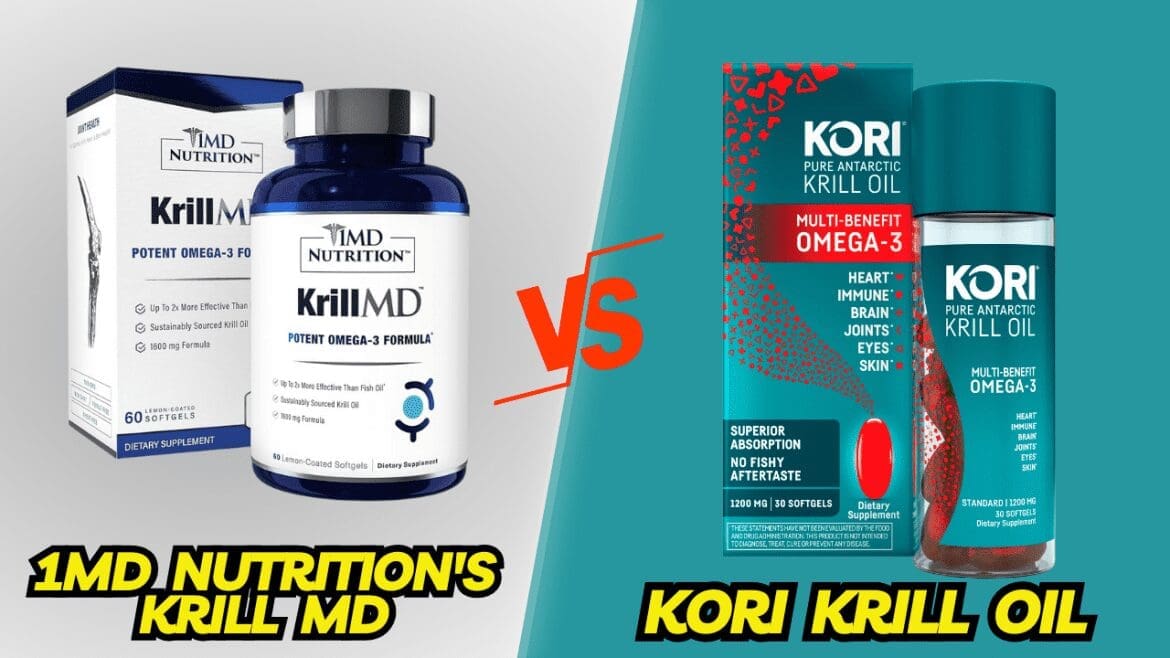In an era where prolonged screen time and pollutants are common, maintaining good eye health has become more challenging than ever. The desire to boost eye health has resulted in an overflow of nutritional supplements designed to support eye health and overall wellness. So, how do you decide which supplement to choose? Krill oil has recently gained popularity for its rich omega-3 fatty acid content. Omega-3s have shown many benefits for eye health. In this article, we’ll discuss krill oil benefits for eyes and compare Kori Krill Oil Softgels and 1MD Nutrition’s KrillMD to help you decide which krill oil supplement best suits your needs.
You May Also Like:
CVS Krill Oil vs. Kori Krill Oil: Which is Better?
Transparent Labs Krill Oil Review: A Closer Look at This Quality Source of Omega-3s
What’s Your Choice for Krill Oil Benefits for Eyes: Kori Krill Oil Softgels vs. 1MD Nutrition’s KrillMD is an original (News7Health) article.
Understanding krill oil
Krill oil is extracted from tiny, shrimp-like crustaceans called krill. These remarkable supplements have recently gained attention for their potential health benefits, especially in terms of eye health. Krill, found in the icy waters of Antarctica, is a rich source of omega-3 fatty acids, particularly eicosapentaenoic acid (EPA) and docosahexaenoic acid (DHA).
Omega-3s are known for their multi-dimensional health benefits, including robust support for eye health. DHA, in particular, is vital to eye health and is abundantly present in the retina; this concentration not only bolsters its structural integrity but also fosters clear and healthy vision.
Krill oil’s omega-3 content endows it with potent anti-inflammatory properties, beneficial for addressing inflammatory eye conditions. Inflammation-related conditions such as dry eye and age-related macular degeneration (AMD) may be mitigated by integrating krill oil into your daily routine.
Krill oil is also unique due to its phospholipid content, which increases its bioavailability. Your cell membranes comprise an outer layer of phospholipids, and the phospholipids in krill oil help your body deliver omega-3s directly to cells without requiring additional processing.
Now that you’re familiar with the benefits of krill oil, let’s compare Kori Krill Oil Softgels and 1MD Nurition’s KrillMD to examine their krill oil benefits for eyes.
Number of active ingredients
When selecting a krill oil supplement, it is critical to examine the number of active ingredients. Kori Krill Oil Softgels contain pure krill oil as the main active ingredient. This straightforward formula ensures you get the most krill oil benefits for eyes, without any artificial additives or fillers.
This formula also includes choline, which is vital for eye health. Choline is necessary for the production of the neurotransmitter acetylcholine, which is involved in the parasympathetic nervous system. This system is responsible for tasks such as pupil constriction, tear production, close-up vision, and regulating the amount of light that enters your eyes. Choline also contributes to the stability of the cells and tears on the ocular surface. Choline deficiency can lead to eye conditions such as retinal hemorrhage, glaucoma, and dry eye syndrome. The inclusion of choline in Kori Krill Oil Softgels makes it a valuable asset for promoting eye health.
Similarly, 1MD Nutrition’s KrillMD also contains pure krill oil with minimal additional ingredients, formulated simplistically to ensure you get the most significant krill oil benefits for eyes. However, KrillMD does not contain choline, which may slightly diminish its benefits for eye health.

Potency and bioavailability
Potency and bioavailability are crucial factors in examining the effectiveness of a krill oil supplement. The concentration of active ingredients per serving determines potency, while bioavailability reflects how well your body can use and absorb the krill oil in the supplement.
Kori Krill Oil Softgels are renowned for their high potency, providing 1200 mg of pure Antarctic krill oil in each 1-softgel serving. Each bottle of Kori Krill Oil can be directly tracked to its sourcing location using a special online tool. This potency and transparency provide assurance that you get a sufficient dose of omega-3s, allowing you to maximize the krill oil benefits for eyes, surpassing other sources like fish oil. This formula also boasts superior bioavailability thanks to krill oil’s phospholipid structure.
1MD Nutrition’s KrillMD boasts 1600 mg per serving. However, it’s worth noting that you need to take two softgels to achieve this potency, which may be less convenient for some. KrillMD also contains a significant number of phospholipids, so it shares a similar bioavailability to Kori Krill Oil Softgels.
Purity
Purity is also a significant consideration when choosing a krill oil supplement to deliver maximum krill oil benefits for eyes. The purity of a product helps you avoid exposure to harmful contaminants, such as heavy metals and toxins, which carry adverse health effects.
Both Kori Krill Oil Softgels and KrillMD ensure high purity through rigorous quality control measures. However, it’s important to note that there is limited information available regarding the sourcing practices of KrillMD, apart from their assurance of responsible and sustainable practices. This lack of transparency can significantly impact the assessment of the product’s actual purity. Since we know little about the sourcing practices of KrillMD, it’s difficult to determine whether contaminants are present. In contrast, Kori Krill Oil is transparent about its sourcing practices, so you can be sure you are receiving the purest and most effective product.
Pricing
Price can also impact the selection of a supplement, especially for long-term use. Kori Krill Oil Softgels are competitively priced for their potency and purity. The value that this supplement delivers in terms of krill oil benefits for eyes makes it an appealing option for those seeking a cost-effective supplement.
In contrast, the cost of 1MD Nutrition’s KrillMD is over twice that of Kori Krill Oil Softgels for a one-month supply. When considering the purchase of a supplement over the long term, Kori Krill Oil Softgels have the edge for their competitive pricing and value.
Product return policies
A simple and generous return policy can also bring you peace of mind when trying a new supplement. Kori Krill Oil Softgels offer a 14-day money-back satisfaction guarantee when purchased directly from the website. While the return period is shorter than some competitors, it still provides a reasonable timeframe for you to examine how well the product works for you. This policy also reflects the brand’s confidence in the quality of its product.
KrillMD offers a 90-day return policy. However, it’s worth noting that the return process is more specific and complicated than Kori Krill Oil’s. This complex return policy may be inconvenient for the busy consumer.
Consumer reviews
Consumer reviews can provide valuable information regarding a product’s effectiveness. While individual responses may vary, examining reaction patterns can give you a general idea of a product’s quality.
Kori Krill Oil Softgels have received consistent positive reviews from satisfied customers who have reported krill oil benefits for eyes and overall wellness. Many users have praised the product’s potency and purity.
Likewise, KrillMD garners positive reviews, with users praising its quality and simplicity. Both products have a solid following, indicating positive benefits for eye health.
Sustainable sourcing practices
Preserving the delicate balance of the ocean environment has become an increasingly pressing concern in recent years. This concern extends to the sourcing of krill oil supplements, as it is vital to protect the ecosystems where krill thrive.
Sustainable sourcing practices:
Kori Krill Oil’s commitment
Responsible consumers are typically concerned with sustainability, which impacts their decisions when selecting products. In the context of krill oil, detailed information about sourcing practices provides peace of mind for environmentally conscious consumers.
Kori Krill Oil Softgels set a superior standard in this department. Their krill is sourced from sustainable fisheries in the pristine waters of Antarctica, renowned for its stringent regulations and oversight. The Commission for the Conservation of Antarctic Marine Living Resources (CCAMLR) is an international body that manages and conserves marine life in the Southern Ocean. This organization closely monitors krill fishing in this area.
One of the facets that makes Kori Krill Oil’s sustainability exceptional is its focus on responsible harvesting practices. The krill in this product are harvested using patented technology in a way that will not tamper with krill populations in the long term or interfere with the Antarctic food chain.
Kori Krill Oil Softgels are sourced from krill fisheries that employ a careful approach to fishing. This approach includes the establishment of catch limits based on scientific data to prevent overfishing and protect the delicate marine ecosystem.
Additionally, Kori Krill Oil’s sustainability practices are certified sustainable by the Marine Stewardship Council (MSC). This certification guarantees that the product is sourced from fisheries with strict sustainability standards.
When you choose Kori Krill Oil Softgels, you support your health and the planet’s health. Their commitment to responsible sourcing ensures that their krill oil is harvested in a way that protects the marine ecosystem and the survival of this vital species.

1MD Nutrition and sustainability
1MD Nutrition’s KrillMD also emphasizes sustainability; however, it provides limited information about its sourcing practices or certifications. This lack of transparency may be problematic for the environmentally responsible consumer.
Kori Krill Oil Softgels have the edge regarding sustainability due to their transparency about their sourcing practices. Their MSC certification also puts the responsible buyer’s mind at ease regarding their harvesting and manufacturing practices. Opting for Kori Krill Oil Softgels not only gives you krill oil benefits for eyes but also helps protect marine resources and the environment.
Overall value for the cost
In our comprehensive analysis, Kori Krill Oil Softgels emerge as the superior krill oil supplement. While both products offer high potency and bioavailability, Kori Krill Oil stands out for being more cost-effective, sustainable, and transparent in its practices. When you choose Kori Krill Oil, you can be sure that your product is free of contaminants, ensuring you receive the maximum krill oil benefits for eyes and overall wellness.
While 1MD Nutrition’s product boasts both effectiveness for eye health and sustainability, it falls short in providing the same standard of transparency as Kori Krill Oil, potentially leaving conscientious consumers with unanswered questions.
If you prioritize purity, potency, transparency, and sustainability in your krill oil supplement, Kori Krill Oil Softgels stand as the premier choice.
Krill for optimum eye health
Eye health is something people tend to take for granted until issues arise. Take proactive steps toward optimal eye health by incorporating krill oil into your daily routine. When selecting a krill oil supplement, make sure to choose a reputable brand with an emphasis on quality, value, and sustainability. That said, make sure to consult a healthcare professional before adding a new supplement to your regimen.

Further reading:
National Library of Medicine: Omega-3 Fatty Acids and Eye Health: Opinions and Self-Reported Practice Behaviors of Optometrists in Australia and New Zealand
Environmental Defense Fund: Sustainable Seafood Guide
American Optometric Association: Diet and Nutrition
WWF.org: Diminishing sea ice threatens delicate Antarctic ecosystem and raises alarms
Mayo Clinic: Dry eyes
Important Note: The information contained in this article is for general informational purposes only, and should not be construed as health or medical advice, nor is it intended to diagnose, prevent, treat, or cure any disease or health condition. Before embarking on any diet, fitness regimen, or program of nutritional supplementation, it is advisable to consult your healthcare professional in order to determine its safety and probable efficacy in terms of your individual state of health.
Regarding Nutritional Supplements Or Other Non-Prescription Health Products: If any nutritional supplements or other non-prescription health products are mentioned in the foregoing article, any claims or statements made about them have not been evaluated by the U.S. Food and Drug Administration, and such nutritional supplements or other health products are not intended to diagnose, treat, cure, or prevent any disease.


